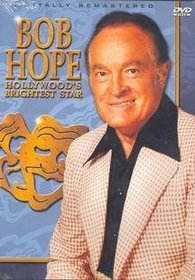| Actors: Hy Averback, Bob Hope, Larry Gelbart Genres: Comedy, Documentary Sub-Genres: Comedy, Documentary Studio: Bci / Eclipse Format: DVD - Color - Closed-captioned DVD Release Date: 01/01/2002 Release Year: 2002 Run Time: 1hr 7min Screens: Color Number of Discs: 1 SwapaDVD Credits: 1 Total Copies: 0 Members Wishing: 0 MPAA Rating: NR (Not Rated) Languages: English See Also: |
Search - Bob Hope: Hollywood's Brightest Star on DVD
  | Bob Hope Hollywood's Brightest Star Actors: Hy Averback, Bob Hope, Larry Gelbart Genres: Comedy, Documentary NR 2002 1hr 7min Though this program states it is not endorsed or authorized by the Bob Hope estate, it is nonetheless an enjoyable, if low budget, overview of this great comedian's career. Hosted by bandleader Les Brown's son (Les Brown ... more » |
Larger Image |
Movie DetailsSimilarly Requested DVDs
|
Movie ReviewsA Treat For Devotees Of That Abiding Personality, Bob Hope. rsoonsa | Lake Isabella, California | 08/07/2006 (5 out of 5 stars) "It is plainly marked upon this documentary film's DVD case that the work is "not endorsed or authorized by Bob Hope, etc." but its organization is structured well and will be more than satisfactory to fans of the great comedian. The piece is produced, directed, scripted, and largely narrated by Les Brown, Jr., whose father's band enjoyed a lengthy relationship with Hope, enduring 49 years as his orchestral support. The largest portion of additional commentary comes from Brown, Sr., Hy Averbach, and others from the ranks of the Brown band. Arranged in linear fashion, the film will provide some fresh images for viewers to enjoy from the entertainer's earliest show business years in the American Midwest and New York as he plays their vaudeville circuits, and it is easily apparent that Hope moved countless audiences to laughter while performing for many forms of media. These include, along with early stage appearances including performances on Broadway, a long lasting stint as the nation's most popular radio personality, many films, countrywide touring, and his extraordinary shows at military bases that begin during World War II, including some white-knuckle moments during 1967/72 in Vietnam, all of which are touched upon during a documentary that furnishes a wealth of interesting clips. Brown, Jr. makes a point early on that Hope loves to dance, and this becomes a marked motival element, augmented by periodic footage illustrating the star's manifest delight in hoofing. Among numerous memorable highlights are sequences filmed during Hope's long-running radio programme that made of him an American entertainment icon, joined on the shows by such as Jerry Colonna, Betty Hutton, Judy Garland, and a particularly winsome Lana Turner. There are insights to be garnered from the film, such as the effect that this rhythmic monologist has upon his audiences; as one example, non-English speakers laugh at Hope's punch lines because they are aware that what he is saying is funny, despite their inability to understand his words. Film fanciers will appreciate moments from Hope-starring features such as MY FAVORITE BRUNETTE, SORROWFUL JONES, FANCY PANTS, and the ROAD films, of which latter Brown, Jr. relates that the initial entry: ROAD TO MANDALAY (changed to ROAD TO SINGAPORE) was intended as a vehicle for George Burns and Gracie Allen, but when they became unavailable, Paramount Pictures decided upon utilizing Fred MacMurray and Jack Oakie as leads. After the studio had to scotch that pairing, Hope and Bing Crosby, along with Dorothy Lamour became the ultimate cast selections. For that wonderful series of comedies Hope and Crosby "threw away the script", with Hope's penchant for ad libbing, matched by Crosby, making for consistently hilarious fare. It is stressed that Hope is the screen comic of choice for Woody Allen, and the entertainer's connection with Hollywood is emphasized by a record 14 assignments as host of the Academy Awards. A viewer will particularly savour an Award sequence wherein Hope and Humphrey Bogart exchange barbs. Recipient of the Congressional Gold Medal, Hope is also seen here in bits and pieces of stock with all United States presidents from Franklin Roosevelt through Clinton, a high spot occurring when Lyndon Johnson states to the comedian "Bob, thanks for the memory" (the musical signature is not authorized to be heard during the documentary). Additionally, Hope must be credited as a popular success for his television work, as the "Bob Hope Christmas Special" pulled the largest T.V. audience for each of its 17 productions, and shown here as well are scenes with Hope and his guests appearing upon his monthly show, including Frank Sinatra, Jimmy Durante, Jack Benny, Fred MacMurray, Janis Paige, Marilyn Maxwell, Rosemary Clooney and David Niven. The greatest percentage of footage is given over to Hope's activities in support of American servicemen, beginning during World War II, later in Korea in 1950 (for radio transcription), and continuing through five visits (for television) into Viet Nam, the final junket coming in 1972, and all richly enjoyable to his audiences, whether as civilians at home in the U.S. or as Naval personnel aboard aircraft carriers. Hope and his various entourages logged eight million miles to benefit the U.S.O., often under genuinely hazardous conditions. Despite its meagre budget, this brief (67 min.) work offers nicely balanced coverage of Hope's career, incorporating his first major stage triumphs on Broadway in musicals Roberta and Ziegfeld Follies, and his earliest Paramount film, BIG BROADCAST OF 1938. A half-century relationship with saxophonist Les Brown and his Band of Renown that began in 1947, his loyalty to singing actress Frances Langford as well as to his extensive repertory of players, and his expanded use of topical humour, initially employed for his radio shows, each assisted in making him America's number one entertainer in the latter medium in addition to those of film and television, for many decades."
|











